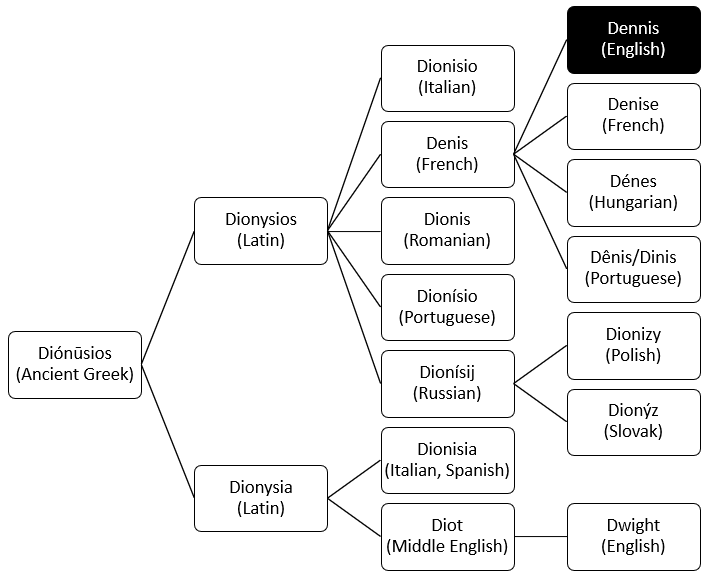
Dennis, your name is really cool! It’s an ancient Greek name that means “the Zeus of Nysa.” Nysa was a forested land of nymphs where Dionysios was raised. Zeus was his father, which is why he was named after him, much the way that Finwë’s descendants include “Fin” in their names.
This is one of those “name within a name” problems that I often talk about in these articles, just doubled. When we have a name within a name, we have two options: we can leave it untranslated, or we can translate the inner-name’s meaning as well. When we have deities, we also have the option of replacing the deity’s name with a cultural equivalent deity.
Let’s start with Dionysios himself. Let’s look at a broad description of Dionysios’s godly realms: drunkenness, madness, youth, wine, and parties. The closest of the Valar to Dionysios is Nessa who appears to be the goddess of frolicking gayly through the forest, a trail of deer following her. Her name also literally means “young.”
Next, let’s tackle Zeus. His cultural equivalent is Manwë, the Vala who is the Elven sky god. Zeus’s name is just the word “sky.”
Nysa is a place name based on a word for “tree,” and a tree-land is a forest, so when I translate it, I’ll translate it as “forest.”
So, for each of these I will do four translations.
- The name Dionysios Elvish-ized, treating it like a Common Eldarin name passed down the ages to Sindarin and Quenya.
- The cultural equivalent Vala: Nessa.
- Zeus replaced with his equivalent deity: Manwe; Nysa translated as “forest.”
- Both translated, making “sky forest” as the name.
Sindarin
- Let’s start by Sindarin-izing the Ancient Greek “Diónūsios.” First, we’d drop the case marker -os at the end. Then the S would become first an H, then be lost entirely. The “ūi” would become “ui.” Lastly, “io” became a long vowel Y.Thus, we’d get: *Dýnui as the Sindarin version.
- Nessa’s Sindarin name is Neth, or “young.” On its own, it’s a gender-neutral name. To make it gendered, you can add a name suffix, like:Feminine: Nethes, Nethel, or Nethil
Masculine: Nethon - Manwe’s name was borrowed into Sindarin as-is, so when combined with words for “forest” (Taur and Eryn) you get Manwedor and Manwenyr.
- And last but most favored, “sky” is “Ell,” “Gwilith,” or “Gwelwen” and “forest” is “Taur” or “Eryn.” Put these together, and you get: Eldor, Elleryn, Gwilithdor, Gwilitheryn, Gwelwethor, and Gwelweneryn.
When it comes to naming your Middle-earth characters, only the names meaning “sky forest” make any sense. The rest might as well be a squawking hen. Most importantly, Elves never give themselves the names of gods. To them, it’d be impersonating a god, which is pretty taboo. If you want to have your character be a disciple of Nessa, I’d suggest something like Nethnil (someone interested in or fascinated by Nessa) or Nethvyr (servant of Nessa).
Quenya
- Quenya-izing Diónūsios is much easier than it is in Sindarin. First, we drop the case suffix -os. Then the D would become an L.Then we put a Quenya masculine name suffix on it, and we get: *Lionúsio.
If you add a feminine suffix, you get *Lionúsie - Nessa is of course already in Quenya. The only thing that I can add is that in Pre-Feanorian Quenya and in Vanyarin Quenya, it’s Neþþa. On its own like this, Nessa is a gender-neutral name. To make it gendered, you’d add a name suffix:Feminine: Nesse
Masculine: Nesso - Manwe is of course already a Quenya word. Taure is the word for “forest.” Put these together and you get Manwetaure. Let’s add some gender-specific suffixes for those who want them:Masculine: Manwetauro
Feminine: Manwetaurie - For “sky” we have two words: “Helle” and “Wilya.” In Exilic Quenya, the W became a V, making Vilya The word for “forest” is “Taure.” Put these together and you get:Gender-neutral: Helletaure and Wilyataure.
Masculine: Helletauro and Wilyatauro.
Feminine: Helletaurie and Wilyataurie.
Like the Sindarin versions, only the 4th set of names make any sense as the names of Elves. If you really want your character to have an homage to Nessa, I suggest Nessandil “one interested in or fascinated by Nessa” or Nessandur “servant of Nessa.”
![]()
Dennis, I hope that you found this article interesting and useful!
If you’d like your name translated in this series, comment below and I’ll consider it for a future article!
Source:
Hanks, Patrick & Hodges, Flavia. A Dictionary of First Names Oxford University Press. 1990. pgs 82, 92.
Wiktionary “Διόνυσος” Last Edited: June 15th, 2021.
Wiktionary “Διονύσιος” Last Edited: May 21st, 2021.

Is the site still managing to do okay for staying up? Recently I saw you had issues.